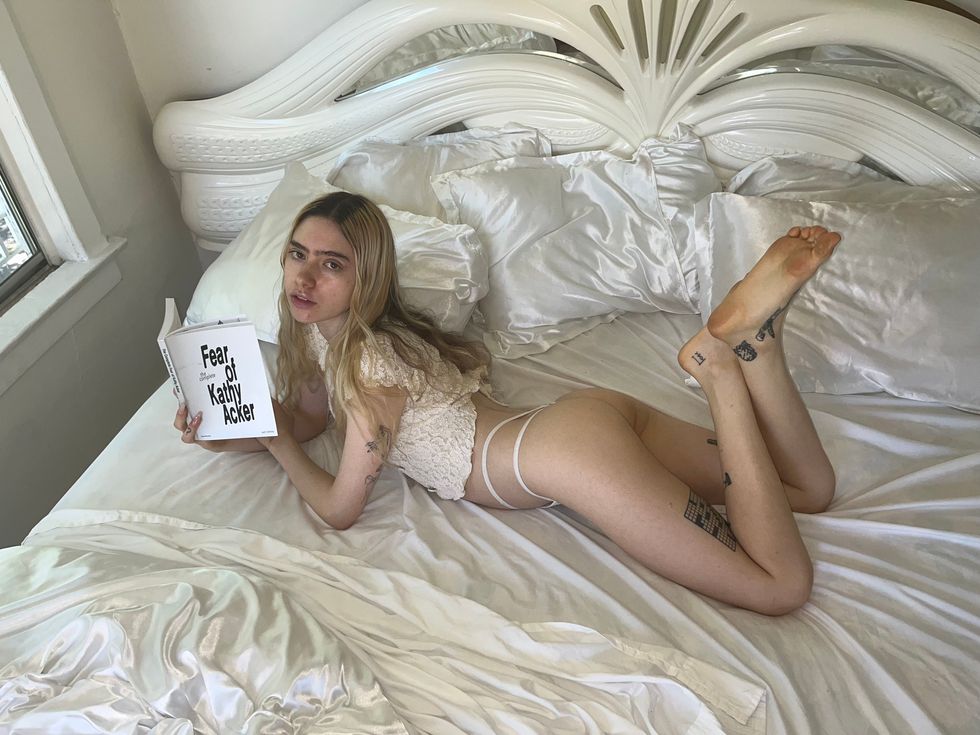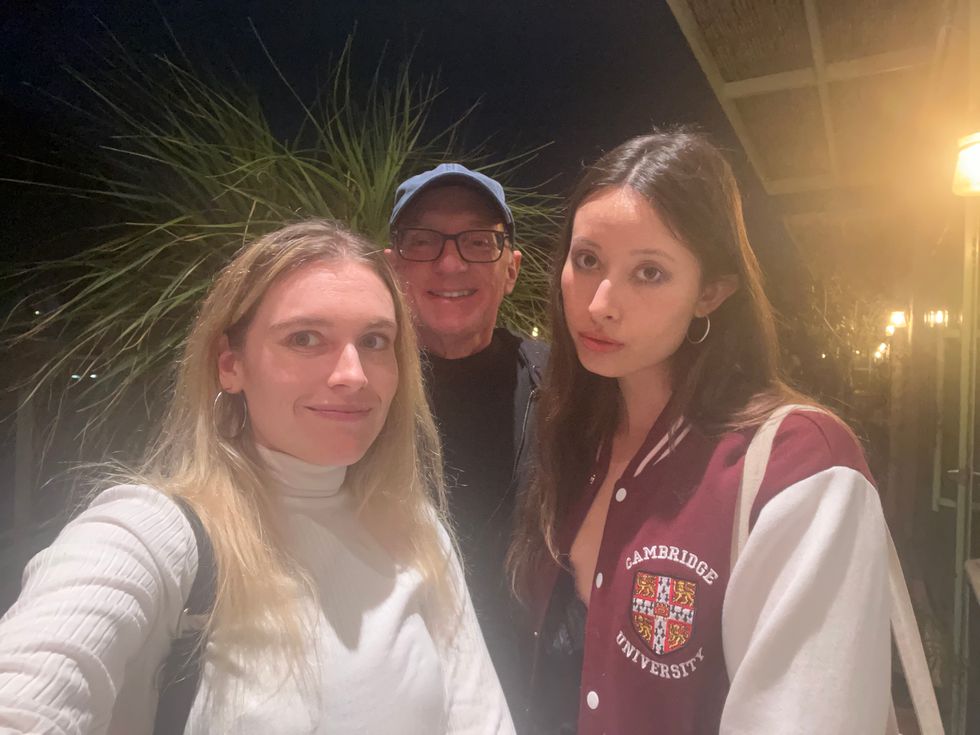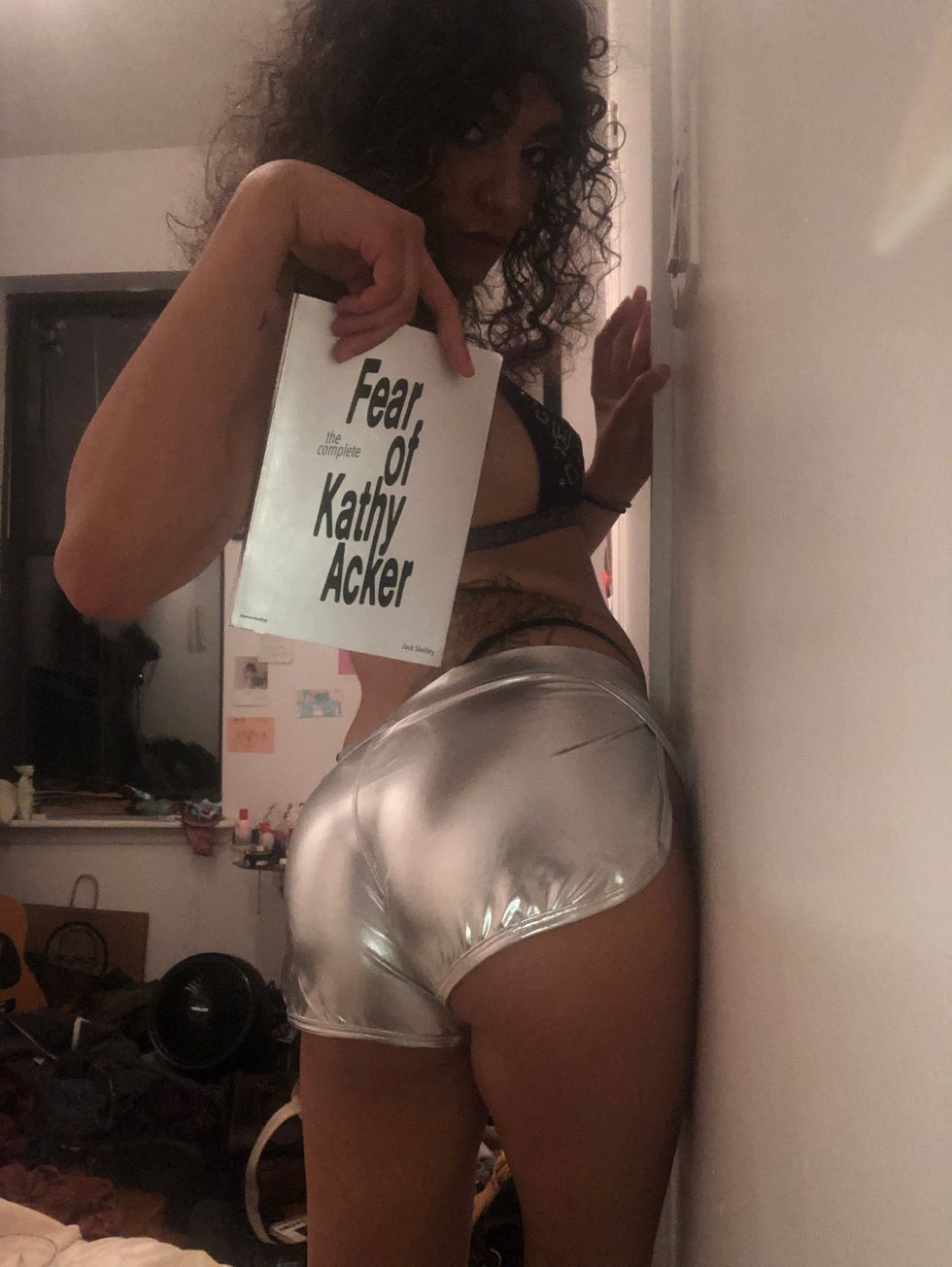
How Queer Gen Z Resurrected a Salacious '80s Novel
By Sammy LorenJan 04, 2024

In May 2023, 26-year-old nonbinary poet and sex worker Lily Lady left their Bushwick apartment for a trip to LA. Lady was staying at American Apparel founder Dov Charney’s Silver Lake mansion and in their free time hitting readings in Echo Park. One morning, Lady woke to a DM on Instagram. A curator wanted to know if Lady might be open to hosting a book launch for an unknown writer named Jack Skelley. Lady, a fixture in LA and NYC’s simmering alt lit scenes, agreed, knowing nothing about Skelley or the long, improbable odyssey of his debut novel The Complete Fear of Kathy Acker. A few days later, Lady received a copy of the slim gray book, packed it and a water bottle into their tote bag and went to workout at LA Fitness.
“I sat on the recumbent bike and I read,” Lady tells PAPER. "I did a whole workout and I was so sweaty and the book was so damp, which was very appropriate.”
Lady couldn’t put The Complete Fear of Kathy Acker down.
“The book’s sexuality is very uninhibited,” Lady says. “I just ate it up. I read it in one day.”
Lady went on to not only emcee the buzzy New York and Los Angeles launches of Skelley’s book, but has also since developed an intimate friendship with the author nearly five decades their senior.
“In the scene we owe Jack a big debt,” Lady says. “Whether we read Jack or not... a lot of people walk in his legacy in the scene right now.”
Lady’s enthusiasm for Skelley’s novel is far from unique. If you spend your life at readings (or online), you too may have noticed Skelley’s book. Since its release in June 2023, The Complete Fear of Kathy Acker — a libidinous rollercoaster about capitalism, art and sex — has emerged as a symbol for a new generation of writers and artists, many of whom are young, women and queer. Yet the book’s popularity among Gen Z alt lit kids was far from guaranteed, and in fact, before its release, the novel had languished in the slush pile of avant-garde literary history for almost 40 years.
Why are so many young women obsessed with a smutty old book by a Boomer?
In the mid '80s, a striking, shaggy-haired 20-something named Jack Skelley was living in Venice Beach and doing the things all young bohemians do: starting punk bands, going to exhibitions, writing poetry. In those days Skelley circled around the westside cultural institution Beyond Baroque where he’d party at openings with Dennis Cooper and Mike Kelley. Inspired by his scene and by the radical, cut-up works of Kathy Acker, Skelley abandoned poetry and began writing a novel.
“You can do more in prose, ironically enough,” Skelley says from his book-lined home in Culver City. “At least for the way that writers like Acker presented it, you could go in any direction and change identities. The Complete Fear of Kathy Acker isn’t just my voice, but my friends’. I could steal identities, steal their stories.”
Like any layered work of literature, The Complete Fear of Kathy Acker examines many issues. It skewers Reagan-era consumerism and America’s obsession with stardom all while dancing through the minefields of artistic scenes and friendships. Yet perhaps most titillating about the novel is its representation of sex. An exhilarating, refreshingly explicit sexuality erupts across its 136 pages that few publishers would risk touching in the post #MeToo era, especially one authored by an older straight white man. As it turns out, no one was interested in publishing it back in the ‘80s, either.
Skelley finished the novel and a couple of obscure zines ran excerpts. But a full publication attempt failed, and by the ‘90s Skelley had given up hope. The work appeared fated to disappear.
Little did Skelley know that Chris Kraus and Hedi El Kholti, co-editors of the iconoclastic publisher Semiotext(e), had been fans. Back in the late ‘80s Kraus had read The Complete Fear of Kathy Acker in one of those zines and shared it with El Kholti. Then, in 2020, El Kholti crossed paths with the curator behind a Beyond Baroque exhibition at the Hammer Museum and the topic turned to Skelley’s “lost” novel.
“I assumed it might sell a few hundred copies,” El Kholti tells me by phone. “I figured its audience might be old LA punks, artists interested in that ‘80s scene. It’s been cool that all these Gen Z artists are into it.”
The novel has sold more than 2,000 copies and is now in its third printing, a blockbuster for an experimental “rediscovered” debut released by an independent press. It’s also being adapted for the stage by 23-year-old playwright Siena Foster-Soltis with an all femme cast.
“The book has an exuberant sexuality — it’s self-affirming and self-effacing at the same time, and it’s never misogynistic or mean,” writes Kraus by email from Baja, where she’s polishing her latest book. “I think younger people are excited by the freedom in this, a freedom that’s harder to find now that everyone’s utterances are permanently recorded on social media and therefore so easily criticized.”

Lily Lady
The energy swirling around The Complete Fear of Kathy Acker owes a lot to the energy swirling around the circus of reading series in LA and NYC. Much has been written about these events that are dragging literary life from sleepy bookshops and into bars, parking lots and raves. As the curator of Casual Encountersz, I’ve actively worked to build this scene and have had a front row seat to how chronic online exhibitionism can feed into shaping literary tastes.
Take, for example, the parade of thirst traps showcasing the book on Instagram. Some women pose practically nude holding the novel; others are glammed up for the clubs with the book in tow. Whatever the state of undress, these photos match the novel's sexual charisma while also echoing its lessons about the elusive nature of the self. Similar to how Skelley’s narrator must navigate the fractured American psyche, so too must today’s selfies grapple with the blurry boundaries of online identity.
This spectacle, in part, led the co-curator’s of the late night reading series Car Crash Collective to reading The Complete Fear of Kathy Acker.
Writer Erin Satterthwaite, 28, along with 24-year-old Brittany Menjivar, both originally spotted Skelley and his book popping off on Instagram. Then fate threw Satterthwaite and Skelley onto the same lineup at the Ace Hotel in Downtown LA (full disclosure: I helped organize this reading).
“Initially I’d seen it in my Instagram feed and had been intrigued by the title,” says Menjivar. “I was out of town during the Ace Hotel reading but I saw all these photos of people hanging out with Jack Skelley. I was like, I have to find out who this guy is. So I borrowed Erin’s copy.”

Erin Satterhwaite, Brittany Menjivar and Jack Skelley
The duo invited Skelley for drinks in Silver Lake, where they chatted about LA’s underground in the ‘80s, which The Complete Fear of Kathy Acker paints in vivid detail. Satterthwaite and Menjivar asked Skelley to read at the following Car Crash Collective event, and encouraged him to share sections he’d been hesitant to read publicly: specifically the novel’s opening chapter where the narrator, while wandering through a mall, imagines a wild sexual fantasy after passing by some manikins.
“Jack was scared,” Satterthwaite recalls. “He was like, 'Are you sure?'”
The ladies were sure.
A few weeks later at a packed LA bar, Satterthwaite noted to the audience that the lineup was all women and “one man who writes about sex in a very feminine way, so we count him as one of the girlies.” In a now semi-infamous moment that’s become the stuff of niche internet literary legend, Menjivar would add: “Jack Skelley writes like a woman.”
For 22-year-old queer writer and raver Zoey Greenwald, reading Skelley’s book provoked visions of a possible past life.
“I picked this up and was like, Did I possess some dude's body in the '80s and write this book?” Greenwald muses. “I'm influenced by subculture, I'm influenced by punk, I'm influenced by the fact that girls are hot.”

Zoey Greenwald
Greenwald, along with trans poet Sul Mousavi, edits Spasm, a forthcoming print magazine covering broadcast, nightlife and ephemera. Though written 20 years before Greenwald or her friends were even born, The Complete Fear of Kathy Acker echoes many of the trends she sees online and at clubs.
“In youth culture right now there's a turn towards ephemera,” says Greenwald from her childhood bedroom in Santa Clarita, where she’s living while pursuing an MFA at CalArts. “People are really into the vestiges of punk and zines. There's just a real thirst for... art pertaining to a subculture, which is maybe why you have it resonating more so with youth.”
Greenwald and Mousavi invited Skelley to read at Spasm’s inaugural LA event. Again, Skelley would be the only cishet man in a lineup, this one full of queer femmes.
“Having Jack at the reading was a no-brainer,” Greenwald says. “I mean, there's cruising in this book. It's straight, but it's still socially a very similar realm. Jack happens upon a space that is important to gay people because it's at an intersection of sex and subculture, which is where gay people are all the time.”
Few are as surprised, or grateful, for the resurrection The Complete Fear of Kathy Acker more so than Skelley himself. Now married with kids and living in Culver City, Skelley is still a creature of the counterculture, crossing LA to attend readings and performances. He loves the book’s embrace by women and especially the queer community as he’s raising a trans daughter.
“In the same way that maybe 80% of my readers are women, 80% of my reading is women,” says Skelley, who in addition to Kathy Acker, Lynne Tillman and Chris Kraus could list a library of iconic women as influences. And though that may help explain why the work has become a hit among alt lit it girls, it doesn’t quite explain it all. “I’m still trying to figure it out.”
Photos courtesy of Zoey Greenwald, Erin Satterhwaite, Brittany Menjivar and Lily Lady